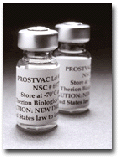
![]()
 Pancreatic Cancer
Pancreatic CancerPancreatic cancer affects nearly 30,000 people in the U.S. annually. Current treatments include surgery, chemotherapy and radiation. Unfortunately, pancreatic cancer is difficult to control with available therapies. Over 29,000 deaths are attributed to pancreatic cancer each year in the U.S.
Breast Cancer
|
|
||||||||||
|
PRODUCT CANDIDATES - Pancreatic and Breast Cancers
A Phase I/II trial conducted at Georgetown University's Lombardi Center, testing two cancer vaccines developed by Therion in collaboration with National Cancer Institute and Aventis Pasteur, revealed that human T cell immune responses induced by therapeutic vaccines result in increased survival of patients with late-stage metastatic cancers. These vaccines, vaccinia-CEA (V) and ALVAC-CEA (A), were used in a combination regimen known as a �prime-boost� protocol in late-stage cancer patients. Five of nine patients treated with sequential vaccinations of vaccinia-CEA and ALVAC-CEA (VAAA) not only showed increased immune responses, but also remained alive two years out compared to zero long-term survivors in other treatment groups. The study�s principal investigator, John Marshall, M.D., of Georgetown University Medical Center,presented this data at the 2001 American Society of Clinical Oncology (ASCO) meeting. To read the full press release, please click here. CEA/MUC-1/VF/TRICOM™ - Therion is developing CEA/MUC-1/VF/TRICOM™ as a lead candidate to treat pancreatic and breast cancers. This lead product builds from previous clinical results of a prototype CEA vaccine that in Phase I/II clinical trials demonstrated encouraging survival data in late stage cancer patients. Specifically, patients who received the prototype vaccine or the prototype vaccine plus a locally administered cytokine saw 60-80% survival, respectively, at two years, compared to 0% survival in the comparison group. This vaccine candidate uses a recombinant vaccine to target carcinoembryonic antigen (CEA, a well-characterized tumor antigen expressed by approximately 90 % of pancreatic cancers and 50 % of breast cancers) and MUC-1 (a protein expressed by approximately 90 % of pancreatic and breast cancers). CEA/MUC-1/VF/TRICOM™ utilizes pox virus vectors bearing both the CEA and MUC-1 tumor antigens to stimulate and sustain (prime and boost) an immune response against tumor cells. In addition to the antigens, the clinical candidate also incorporates TRICOM™, Therion�s co-stimulatory system for enhancing immune response against tumor cells. The TRICOM™ component is designed to optimize, through the expression of multiple co-stimulatory molecules, antigen presentation and activation of cytotoxic T-cells critical for tumor destruction. CEA/MUC-1/VF/TRICOM™ will enter Phase II clinical trials to treat pancreatic cancer in 2003.
While Therion's most advanced cancer vaccines target predetermined tumor-specific antigens such as PSA and CEA, Therion's potential DTM products are designed to treat a wide variety of solid tumors by modifying the patient's own cancer cells to act as antigen presenting cells in the generation of a tumor-specific immune response. This modification is initiated by injecting the DTM immunotherapeutic directly into solid tumors, such as melanoma, head and neck. The DTM product candidates express certain key immune modulating proteins known as co-stimulatory molecules, modifying the patient's own tumor cells that already express their own unique set of tumor-associated antigens. These modified tumor cells can now activate systemic cell-mediated immune responses to the patient's tumor cells and cause their destruction.
Melanoma PRODUCT CANDIDATES - Direct Tumor Modification VF/TRICOM™ - Therion�s lead DTM candidate, VF/TRICOM™ utilizes pox virus vectors to stimulate and sustain (prime and boost) an immune response against tumor cells. The product candidate incorporates TRICOM™, Therion�s co-stimulatory system for optimizing immune response against tumor cells. The TRICOM™ component is designed to optimize the tumor cell�s own antigen presentation and thereby activate cytotoxic T-cells critical for tumor destruction. VF/TRICOM™ will begin Phase I clinical evaluation to treat melanoma in late 2002.
|
|||||||||||